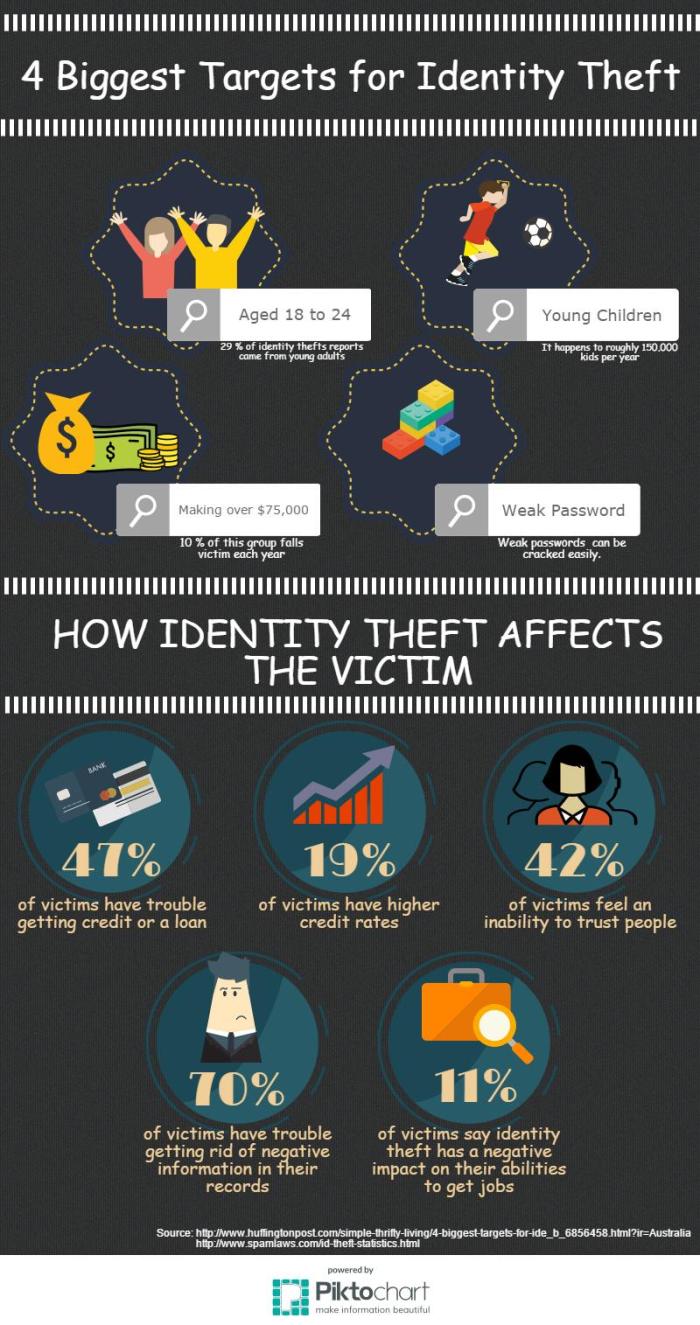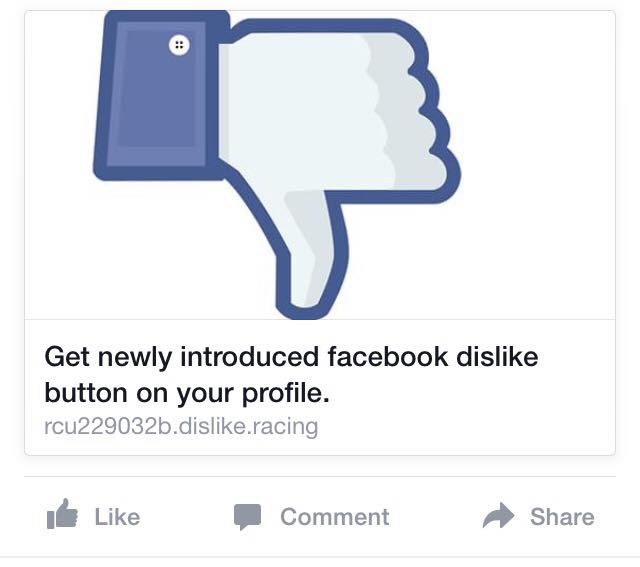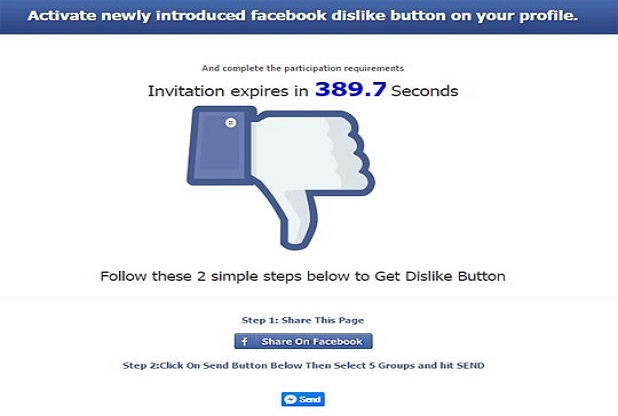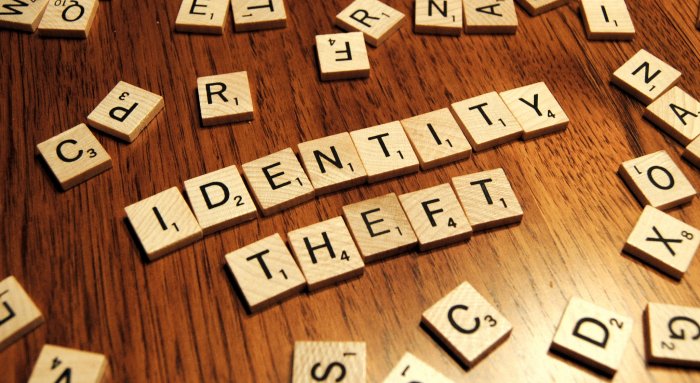Identity theft is everywhere. However, do you know who are the 4 biggest targets for identity theft and how often it happens? And how identity theft affects the victims?
Here’s the infographic.

-KYCL-
Earlier this month, Facebook CEO Mark Zuckerberg announced that the long desired ‘dislike’ button would be publicly revealed soon. However, the scammers have already used the dislike button as bait to trap Facebook users into believing that clicking on some links would give them an early access to the dislike button. The new dislike button scam is expected to spread fast and wide due to its nature and how the Facebook users are anxiously waiting to get the dislike button.
So how would the scammer trick you?
The dislike button scam is a link that explicitly designed to spread through Facebook when one user misleadingly clicks the link and claims for the dislike button.
The Headline of scam link reads: “GET NEWLY INTRODUCED FACEBOOK DISLIKE BUTTON ON YOUR PROFILE.”

What’s next?

After clicking through, there are two more steps to activate the so-called newly introduced Facebook dislike button on users’ profiles.
Users are required to share this page with their friends and send it to five of the groups that they belong to.
Once the link is successful in spreading on users’ Facebook, the scam page will then require users to fill out surveys in order to gather their personal information and account details. Consequently, the information collected will be used to spam their contacts via email.
In the end, the users cannot activate the dislike button.
Obviously, Facebook-provided Dislike button wouldn’t require the users to go to some random-looking third-party site to download it. Hence, when you encounter any random-looking third-party on Facebook, REMEMBER NOT to CLICK IN AND PROVIDE YOUR PERSONAL INFORMATION. As identity is everything. Protect it or risk it?
-KYCL-

Facebook has become a part of our daily life. For most people, it is a nightmare when their Facebook accounts are hacked. Imagine if someone has access to all your photos, private messages, he/she could even contact your friends, abuse your Facebook page, and delete/ use your personal information. Following Miss J’s case and comment from our reader, Liz from the last blog, there’re 4 things you should do when your Facebook account is hacked.
In case you are lucky enough that your password has not been changed. It’s time for you to change your password.
Go to > Home > Settings> General Account Settings > Password to change your password

As to secure your account, go to www.facebook.com/hacked
Follow the Facebook instructions. This process can also help if your account or computer has been affected by a virus or malware.
After you regain the control of your Facebook account and change your password, you should inform your friends about the Facebook account hacked, just in case the hacker has abused or currently is abusing your account.
If you still can’t access your account, you should try to contact your Facebook friends by other social media platforms, via email, or ask a mutual friend to help you to inform them via Facebook. When you again gain access, proceed to step 3.
Sometimes, it is not the identity thieves who have tried to hack into your account randomly, but rather we have granted them access to our personal information in some malicious application. Hence, you should remove some suspicious applications.
To remove suspicious applications,
Go to Home > Setting > Apps and go through the list.
Click X to remove the apps
Click Edit Settings to change what the app can do.

-KYCL-

Hi Miss J,
Thanks for your email. I am grateful that you are willing to share your case with our readers and us.
It is sad to hear that your Facebook account was hacked or taken over by someone else. I understand that having your Facebook account hacked is a nightmare. Imagine if someone has access to all your photos, private messages, he/she could contact your friends, abuse your Facebook page, and delete/ use your personal information. I am glad that when your Facebook account was hacked, you didn’t suffer any loss. In the next blog, I will talk about the 4 things you should do immediately when your Facebook account is hacked. Stay tuned!!!
Cheers,
KYCL
In one of the previous Facebook posts on our Facebook page, one of our readers commented that he would like to know more about how to prevent financial identity theft. So here’s the blog!!!

The Facebook post is a YouTube video, ‘Why care about identity theft?’ produced by Federal Trade Commission. This video is about the story of Lynn. Lynn never had a credit card or borrow money. One day, Lynn decided to apply for a credit card. She sent out the application, but the company turned her down. She got a free copy of credit report and found out that someone used her name to apply for 8 credit cards and she even had a car loan.
So here are some tips to protect yourself from financial identity theft and credit card fraud
Watch your information online
Online shopping and banking have become much more common nowadays. With all the account numbers and passwords floating around, identity thieves can easily steal your information.
Monitor your bank and credit card statements
Verify your mailing address with the post office and financial institutions
Shred sensitive documents
Purchase identity theft protection service
-KYCL-
Following the last post, in real life, the famous confidence trickster, check forger and impostor, Frank Abagnale is now 67 year old and working as a consultant and lecturer for the FBI academy and field offices. He also runs Abagnale & Associates, a financial fraud consultancy company. Frank has written books on his life and fighting identity theft, helped develop fraud detective software, and speaks regularly at conferences and universities.

In June 2015, Abagnale spoke at the Charlotte Convention Centre as part of the 2015 Fraud and Forensic Investigations Conference presented by Pfeiffer University. Frank believes that technology makes the identity crime a lot easier to cheat today than before. No matter how much money companies spend on IT security, hackers will try to use different methods to get the confidential information, like the JPMorgan hack last year. However, before we accuse people of stealing identity information, spend a few second to think about what Abagnale said, ‘we give them this information’.
Hence, Frank Abagnale provided some tips on how to prevent the 21st Century identity theft at the end of the speech
Online banking
Photos online
Debit cards
Shredders
-KYCL-
“Catch Me If You Can” is a 2002 American crime film based on the true story about Frank Abagnale Jr. At the age of 16 to 21, Frank successfully conned about four million dollars by committing several types of identity thieves.

In case, you forget what the film is about or you have not yet watched it before, the story is about the teenaged Frank Abagnale (Leonardo DiCaprio) ran away from his parents when they divorced. When he ran out of money, he learned to survive by becoming a mastermind in identity theft. He began making fraudulent checks in return to obtain cash from the bank as a financial identity thief. He also impersonated a Pan American World Airways pilot, a Georgia doctor, lawyer and legal prosecutor to live and work as someone else and gain advantages as identity cloning. Meanwhile, Carl Hanratty (Tom Hanks), an FBI bank fraud agent, began tracking Frank.
When Frank was posing as a doctor, he fell in love with Branda (Amy Adams), to whom he eventually admitted the truth about himself and asked Branda to meet him two days after their engagement so they could elope. However, two days later, he realized that he had been set up and he escaped to Europe.
In Europe, Frank continued to commit check fraud. Carl managed to arrest him and bring him back to America with the help of the printing professionals in tracing Frank’s location. However, when the plane landed, Frack escaped from the FBI again as he was informed that his dad had passed away and he went back to his old house. When Frank saw his mom with her new family, he decided to give up and was sentenced to 12 years in prison.
While Frank was in prison, Carl visited him from time to time. One time, Frank showed Carl how to identify whether the checks he had on hand was fake or not during the visit. Carl realized that his mastermind would be treasurable for the FBI. Hence, Carl convinced the FBI to offer Frank a deal by which he could live out the remainder of his sentence working in the FBI under the bank fraud department.
Frank attempted to fly as an airline pilot again while working at the FBI. However, Frank eventually returned to work without anyone chasing him. The story had a happy ending that Frank continued to work in the FBI, got married and had three sons.
The film exposes the astonishing tactics of today’s identity theft criminal. Frank carried out some extraordinary scams with techniques like fabricating fraudulent checks, impersonation and pretexting. Frank made the fraudulent checks looked real by skillfully removing the logos on the plane model and sticking it on the checks. Frank also used a pilot’s uniform, jargon, his observation and some prior knowledge of airports he learned from an interview to impersonate someone to steal a person’s identity in the literal sense of the world. With the trick of pretexting, he could easily con people.
While preventing identity theft is never a 100% guarantee, especially when we encounter some professional identity thieves, like Frank Abagnale, there are steps you can take to alert yourself to suspicious behavior before any damage is done and while you can still stake stapes to stop it. Identity is everything. Prevent it or risk it?
-KYCL-
1 in 5 Australians was identity crime victims last year which cost up to $1.6 billion lost. In the Australian society, there is an extensive concern about identity theft. However, Australians have little knowledge about identity crime. So what is identity theft?

According to the non-profit Identity Theft Resource Centre, identity theft can be sub-divided into five groups:
Criminal Identity theft
Criminal identity theft generally refers to the offender who fraudulently identifies him/herself as another person when arrested for a crime by presenting stolen or fake ID. This leads to charge placing under the victim’s name and let the criminal off the hook. Victims will only know their identity were stolen by chance, for example by receiving a court summon, discovering their drivers licenses are suspended when stopped for a routine traffic stop or through background checks done for employment purposes. Unfortunately, victims can hardly clear the incorrect criminal record. Victims might have to prove their own identities by providing some reliable information, like DNA testing, fingerprinting and going to court. Even though victims might obtain an expungement of court records, data aggregators might still have the incorrect criminal records in their databases, whereby affects victims in the future background check.
Financial identity theft
Financial identity theft is the most common type of identity theft. Financial identity theft occurs when a thief uses stolen personal identity to commit a crime resulting in financial injury to the victim. The stolen information may include names, bank account numbers, credit card numbers and other personal financial data. With this information, thieves can get credits, apply for loans or mortgages and purchase goods and services, claiming under the name of the victims.
Identity cloning
Instead of stealing other’s personal information for financial gain or committing crimes under victim’s name, the identity thief uses other’s information to assume his/her identity in daily life is referred as identity cloning. Criminal comprises victim’s life by actually living and working as the victim. Illegal immigrants, people evading from creditors or other individuals, or those who simply want to become “anonymous” for some reasons may perhaps commit identity cloning.
Medical identity theft
Medical identity theft occurs when a thief uses the victim’s name or health insurance number to see a doctor, get prescription drugs, claim health insurance and get other care. When victim’s health record is mixed with the thief’s health information, it may affect future insurability, cause doctors relying on the misinformation in delivering future medical care and result in extra payment records.
Child identity theft
When a child’s identity is used by another person to apply for government benefits, open bank and credit accounts, apply for a loan or rent a place to live, such crime is identified as child identity theft. The offender could be a family member, a friend or even a stranger targeting on children. Usually, such cases are undetected for years, as most children will only discover the problem when they grow up.
Have you ever encountered any types of identity theft? If yes, don’t be shy and send us your case to areyoutheonlyone1@gmail.com
-KYCL-
The University of New South Wales’ Facebook page was flooded with a series of images of porn stars and other inappropriate content in two embarrassing hacks.
Shortly before the UNSW’s Open day, images of semi-clad women and links to sex tips were posted on its Facebook page. One of the posts displayed images of a porn actress Mia Khalifa, while others showed photos of women’s bottoms and breasts, instructions on how to French kiss and picture of guns.
Screenshot from UNSW Facebook page
The UNSW spokesperson said they found out its page had been hacked early on Saturday morning and tried more than three hours to reach the administrators in Australia and internationally. After six hours, the UNSW managed to regain access to the site through other means and remove all the racy content.
However, the second bout of hacking on the UNSW Facebook page over the weekend began late on Sunday night. The UNSW Facebook page started posting more lewd images, including images of soft core porn and sex advice and rather a weird link to the ‘best universities in Italy’.
Screenshot from UNSW Facebook page
Those posts hit a large numbers of likes and comments. At midnight on Sunday, the UNSW published a Tweet stated that it alerted the hack.
Screenshot from Twitter @UNSW
So why had the UNSW’s Facebook page been hacked?
One told SMH that the intern had been handed the keys to the Facebook account, whereas some suggested that the UNSW staff must be drunk. However, Hacklabs director Chris Gatford said that there were 2 possible scenarios for the embarrassing hacks:
The UNSW has long been exposed to cyber-attacks. In 2013, students and staff were subjected to a number of intrusion attacks by unidentified hackers. 25 affected servers and a number of user accounts were shut down on Jan 5, 2014.
The hacking scandal affects the UNSW’s reputation, upsets potential students’ impression on the UNSW and makes the UNSW embarrassed especially when it failed to deflect the second hack.
The hacking scandals exposed the poor cyber security at the UNSW. Sydney IT security expert, Troy Hunt criticized the UNSW for not implementing basic IT security protocols. The cyber-attacks did tap into greater fears over the UNSW cyber security and the confidentiality of student information as in the university information system, it contains countless student data like health, academic records and contact details. Indeed, such hacking scandals are just reflecting the regularly occur cyber-attacks at universities across Australia.
Identity is everything. We should not only take action after things happened, rather we should prevent it. Here are some tips to prevent identity theft for personal/ organisation Facebook page.
-KYCL-
This is your very first post. “ARE YOU THE ONLY ONE?” is a newly launched social media campaign. It aims to create awareness of the risk of identity theft and encourage the public to speak up when they fall victim. In the following weeks, I will be blogging about the latest cases of identity theft, sharing true stories and providing tips in preventing identity theft.
If you want to know more about identity theft, stay tuned and like/follow us on
WordPress: https://areyoutheonly1.wordpress.com/
Facebook: https://www.facebook.com/areyoutheonlyone
Twitter: @areyoutheonly1
If you or your friends have ever encountered an identity theft, send us your story/your friend’s story at areyoutheonlyone1@gmail.com/ inbox us.
-KYCL-